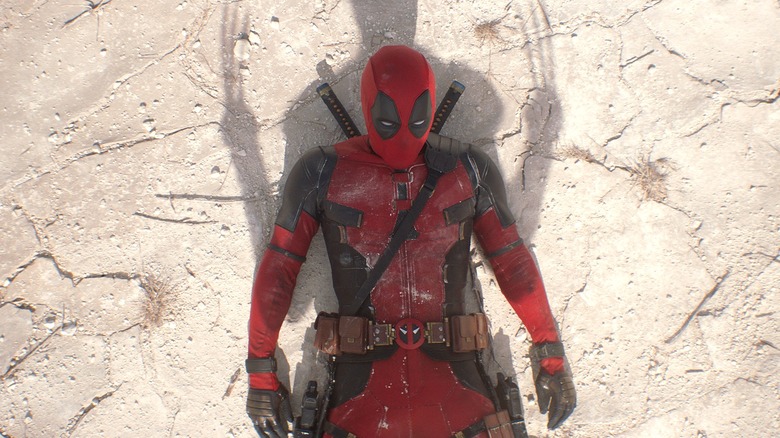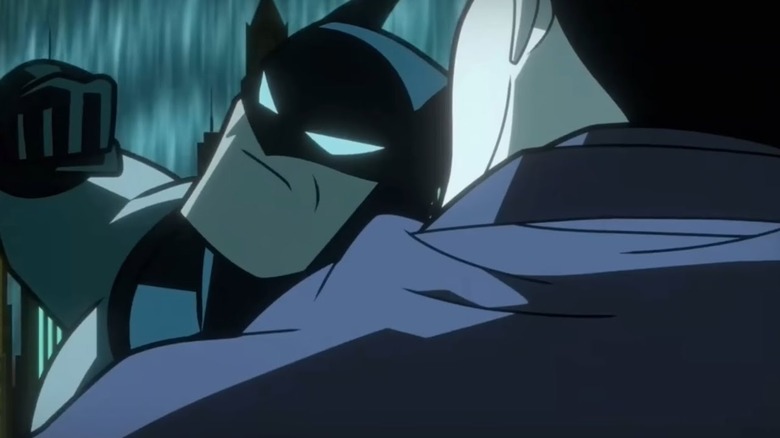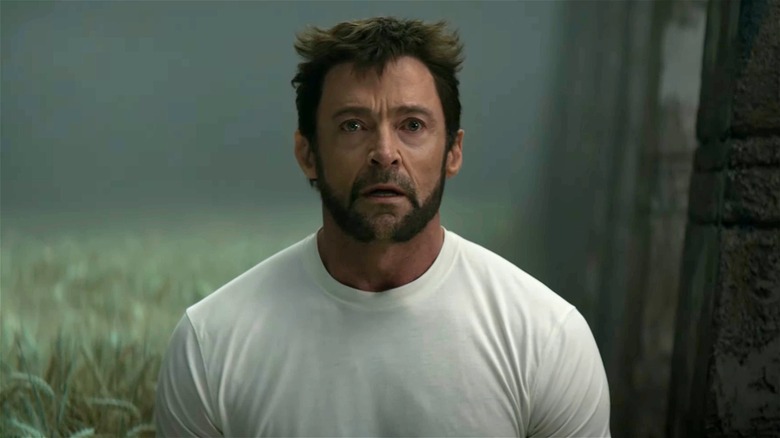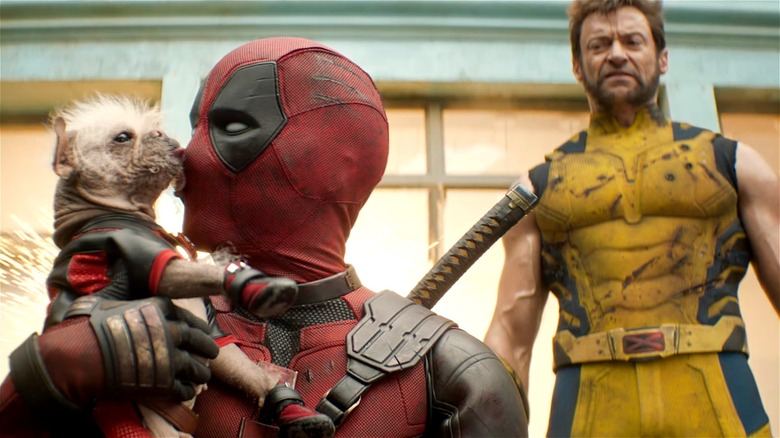Deadpool & Wolverine Continues One Infuriating Superhero Movie Tradition
Contains spoilers for "Deadpool & Wolverine"
It's understandable if audiences are growing weary of every superhero project involving the Multiverse. Despite opening up literally infinite possibilities, most Multiverse-focused stories tend to center around the same thing. Namely, "Hey, look at this former superhero actor making a cameo!" It makes the whole thing feel incredibly limited, and there's been a recurring theme as of late where studios are relying on Multiverses a bit too much, including the recently released "Deadpool & Wolverine."
At one point, Wolverine (Hugh Jackman) has a heart-to-heart with Laura/X-23 (Dafne Keen). He talks about how he failed his world by walking away from the X-Men, allowing the humans to kill them all. It's a pretty vague speech that offers more questions than answers. Did the humans use Sentinels? Why couldn't the mutants fight back? But, obviously, none of this is the point because we've all seen "X-Men" movies before, so just hearing how they all died should get you choked up ... right?
For this moment, "Deadpool & Wolverine" relies on the audience's knowledge of and connection to previous iterations of a now-defunct superhero franchise to get them emotionally invested in this new story. It would've been nice to see a flashback in order to drive home this specific Wolverine's friendship with Charles Xavier and the other X-Men. It feels somewhat hollow as a speech without building up those relationships on its own, which is a problem seen in other superhero movies that involve the Multiverse.
The Flash and Crisis on Infinite Earths — Part Three use this same tactic
A movie needs to be able to pull at viewers' heartstrings; it's essential for getting the audience invested. Generally, this is done through well-defined character moments, putting them in difficult-to-overcome situations, and imbuing them with emotional resonance. But who has time to develop new characters? Instead, modern superhero films simply threaten beloved characters from other projects to pull them in. This is the approach that was taken in "The Flash" and "Justice League: Crisis on Infinite Earths — Part Three."
The climax to "The Flash" sees the various iterations of the titular hero, played by Ezra Miller, witness the destruction of multiple universes. As part of this, some uncanny facsimiles of past DC actors, like Christopher Reeve and Helen Slater, are digitally recreated to just ... sort of stand there. They don't do anything because the fact that their realities are being destroyed is what's counted on to get audiences to care. 2024's "Justice League: Crisis on Infinite Earths — Part Three" also shows the destruction of various universes, including the "Super Friends" cartoon that ran throughout the 1970s to '80s. It even contains Kevin Conroy's heartbreaking final lines as Batman, reprising the role he held from "Batman: The Animated Series."
These examples are even more problematic because these characters are brought in only to destroy their universes seconds later. As a result, the feeling of horror and sadness from seeing Kevin Conroy's Batman be wiped from existence doesn't come from what's been established in the rest of the film. You're sad because you like "Batman: The Animated Series," not because the movie effectively drew you into the story. These multiversal stories have discovered a cheat code for thematic weight, and it feels a bit disingenuous.
Deadpool & Wolverine keeps emotional investment rooted in the past
Would Wolverine's reflection on his failures hit harder if we actually meet his Professor X and fellow X-Men? Potentially. Thinking about it, it's a bit odd that Marvel would forego more cameos with a genuine third-act flashback where we see these characters get attacked and Logan having to confront his negligence. It would resonate more when he convinces Cassandra to help himself and Deadpool by bringing up how his universe's Charles Xavier was a good man if we had an idea of what this version of the Professor was like rather than relying on our perceptions of him from the past.
Wolverine and Xavier's deaths in James Mangold's film are sad, no question about it, and "Deadpool & Wolverine" knows it. An emotional beat occurs when everyone is at the Time Variance Authority, literally just watching the death scene from the ending of "Logan." It's played somewhat for laughs, as the TVA agents cry watching it, but the scene makes the overused storytelling crutch obvious: A lot of these movies don't put in the legwork to craft their own moments to get you to tear up in the theater. They play on your nostalgia, making you remember things from the past and lament that they're no longer around.
Logan's death is tragic. Remembering how good "Batman: The Animated Series" was and calling back to Christopher Reeve's Superman can make one long for a simpler time. It's like weaponized nostalgia; these movies force you to live in the past and feel emotional over these iconic moments rather than attempting to create their own scenes that you'll feel nostalgic for 10 years from now.
Maybe, just maybe, Deadpool & Wolverine also shows a path forward
To be fair, showing the X-Men dying in a flashback sequence would be a costly endeavor for a film that already has a reported budget of around $200 million. And maybe it's unfair to focus on one moment that could've benefitted from explicit gravitas. After all, "Deadpool & Wolverine" at least attempts to have a conversation regarding the overuse of multiversal storytelling in superhero movies, and it shows that the films don't have to rely on cheap nostalgia. They can re-contextualize what has come before.
In the film, Deadpool and Wolverine encounter forgotten Marvel heroes in the form of Jennifer Garner's Elektra, Wesley Snipes' Blade, and Channing Tatum's Gambit. It's interesting the film opts for these cameos rather than someone like Patrick Stewart's Professor X, but it plays into what the film wants to say about the Marvel franchise. Each one wants a chance at redemption. The standalone "Elektra" movie wasn't well-received; "Blade: Trinity" ended Snipes' reign as the Daywalker in lackluster fashion; and Tatum's Gambit spent years in development hell before getting shelved for good, which makes for a genuinely engaging untold story. They all just want one more chance to show they can be cool, too, and prove that they could have shined under better circumstances.
With these cameos, "Deadpool & Wolverine" essentially tells us that no character deserves to wind up in the trash heap. Everyone has a shot at greatness if given the opportunity. It's a theme that every superhero movie involving the Multiverse should consider. Rather than dig up the literal or figurative dead for some easy wins, they should try to have conversations with what has come before. That's far more interesting than a random, uncanny valley Christopher Reeve appearance.



